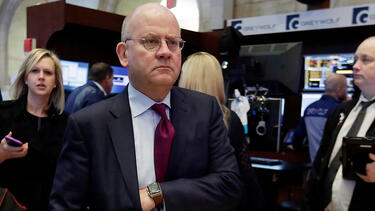Lessons From GE: When The Board Wants You Out
Last month, GE chief executive John Flannery was fired after barely a year on the job. Yale SOM’s Jeffrey Sonnenfeld outlines principles for CEOs looking to keep the support of their boards and stick around for a while.

This article originally appeared in Chief Executive.
John Flannery’s sudden ouster at GE after a mere 13 months on the job by a newly constituted board startled many peer CEOs, as well as analysts, investors, and employees. Admittedly, GE’s share price had dropped 50% since he was appointed a year earlier, but Flannery had inherited a troubled turnaround challenge. Moreover, the board that hired him was not even the board that fired him—it had held only two quarterly meetings before he was dumped.
So what’s to be learned here? Plenty, at least for any CEO who wants to gain—or retain—board support and stick around for a while.
For CEOs to last, they need to:
- Defend CEO tenure. GE moved too hastily. It takes a minimum of two years to master the job of CEO. Yet CEO tenure has been steadily falling, with the average now between five and six years. While governance experts routinely debate how long should a CEO stay in office, there is no set recipe. While research suggests CEO performance falls off after a decade at the helm, there are plenty of examples of highly effective, longer-serving CEOs, such as Colgate’s Reuben Mark. Over his 23-year run, Mark transformed Colgate from an also-ran to a firm with a 17-fold increase in shareholder value that towered over formidable rivals like as P&G, Unilever, Johnson & Johnson, and Gillette. Bob Iger has led Disney since 2005, raising market cap from $48.4 billion to $163 billion over a period of 11 years, recently extending his commitment to 2021, allowing him to complete the integration of Fox Entertainment.
- Know their audience. The activists on GE’s board enthusiastically endorsed the failed strategy of Flannery’s predecessor. In 2017, for no clear justification, short-term activists investors pressed for the removal of Honeywell CEO Darius Adamczyk two months after he took charge, following the 200% total shareholder return of his hugely successful predecessor Dave Cote. The board stood by Adamczyk, who then finished his year in office with a soaring 32% jump in stock price, far ahead of Honeywell’s industrial peers. However, when well-respected CEOs at firms such as DuPont, Athena Healthcare, and Arconic were attacked by shareholder activists, fearful boards afraid of public attacks on their vulnerable reputations capitulated and fired their CEOs.
- Manage business performance expectations. Ellen Kullman led DuPont with unrivaled 266% total shareholder returns in her six years, yet was removed to appease activist investors when the board panicked over two anomalous quarters due to industry wide global events. One of Meg Whitman’s great triumphs in leading HP was managing five-year expectations. Elon Musk, by contrast, has continually set inspiring, but unrealistic technological and financial targets.
- Model exemplary leadership conduct. Ultimately even crony loyalties have limits and no one is truly indispensable, as we eventually saw at CBS, Wynn Resorts, Lululemon, American Apparel, Intel, and Uber. Faced with potential harm to their own reputations, directors will take action when evidence of abuse or unethical behavior mounts.
- Navigate board politics. There are often conflicting career agendas, impenetrable family dynamics, and personal friendships on boards, as Mark Fields of Ford found out, despite leading Ford into design, product quality, and technology triumphs and overseeing the three most profitable years in the automaker’s history. CEOs must maintain individual, personal relations with each director. When the board starts meeting without you, it is time to start packing.